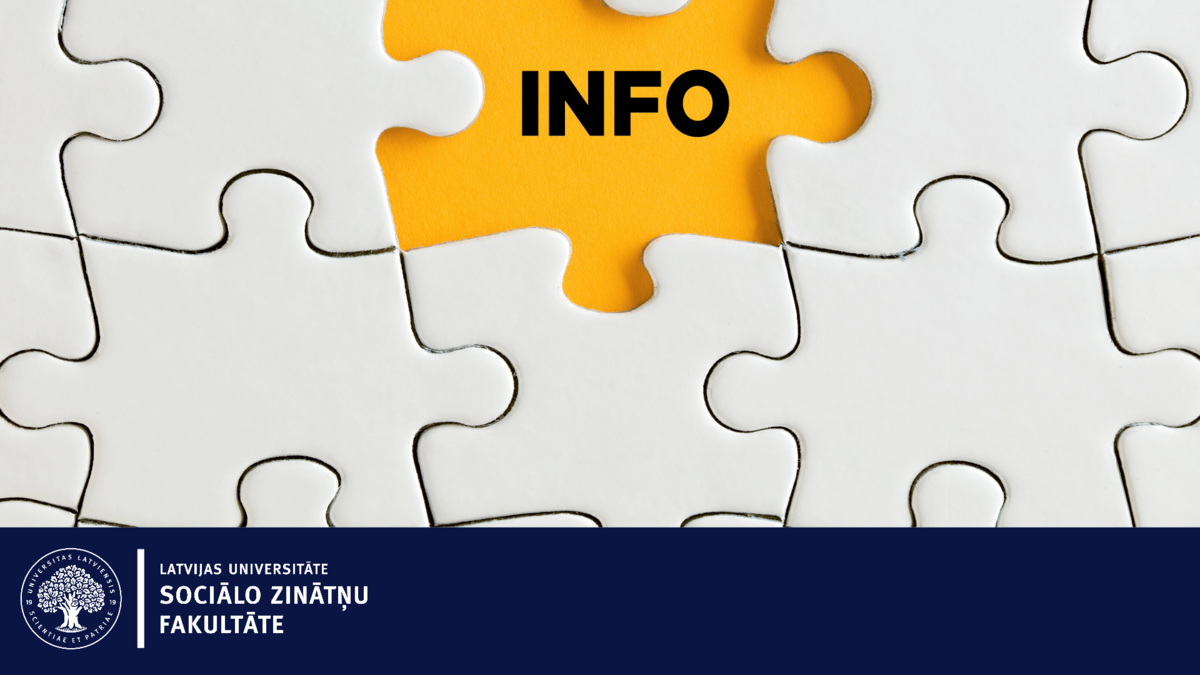
The lecture series will feature the following presentations:
- Key challenges associated with studying political participation by Assoc. prof. Visvaldis Valtenbergs
- Did Populists Stay at Home? The results from the post-electoral survey of Latvia’s National Elections of 2022 by Prof. Jānis Ikstens
- Mapping the relationship between political trust and democracy evaluations: evidence from the European Social Survey by Assoc. Prof. Jurijs Ņikišins, Dr. Renārs Felcis
- Clarity of the elements of securitization processes in the communication of Latvian Government: cases of the Covid-19 and the Russian invasion of Ukraine by researchers Mārtiņš Pričins, Anastasija Tetarenko-Supe
- Latvia's strategic communication plans and practice in response to disinformation (2022-2023) by Dr. Klinta Ločmele, Inga Latkovska, Velta Skolmeistere
The event will be moderated by Prof. Iveta Reinholde.
Date: 24 November, 2023
Time: 17.00-19.00 (EET; UTC+02:00)
Location: Zoom format. University of Latvia, Faculty of Social Sciences.
Zoom link:
https://us02web.zoom.us/j/89013015955?pwd=ZVRhdEtlbmpNaW80bDV5K3g0UHlaUT09
Meeting ID: 890 1301 5955
Passcode: 438550
Abstract
The specter of democratic decline looms large, raising questions about the resilience of our political systems. It is imperative for scholars to confront the realities of democratic backsliding, understanding the contributing factors, and exploring avenues for rejuvenation.
The very essence of democracy hinges on the active engagement of citizens. As we delve into the nuances of political participation, we cannot ignore the critical pillars supporting the democratic edifice—trust, both personal and institutional. Trust is the currency that underpins our social fabric, and its erosion poses a formidable threat to the foundations of democracy. How do individuals cultivate trust in political institutions, and what happens when that trust is betrayed? These questions lie at the crossroads of our academic exploration, guiding us to comprehend the delicate balance between citizen expectations and institutional realities.
Disinformation, a pervasive force in today's political arena, poses a formidable challenge to the very foundations of democratic discourse. How do citizens navigate the labyrinth of misinformation, and how does this impact their trust in institutions? These questions beckon us to unravel the complexities of disinformation and its corrosive effect on the democratic fabric.
Simultaneously, we must grapple with the strategic communication efforts of governments, which add another layer of complexity to academic and policy dialogue. The deliberate shaping of narratives, the crafting of messages, and the use of technology to influence public opinion demand our scrutiny. How do these strategic communication tactics intersect with political participation, and what role do they play in either fostering or eroding trust? These are inquiries that underscore the need for a nuanced understanding of the intricate dance between governments and their citizens.
This lecture is organized under the auspices of the development cooperation project “The Young professionals` school in University of Latvia ‘European studies – Foreign and Domestic Affairs.” The project received development cooperation financing from the Ministry of Foreign Affairs in 2023.
The research undertaken by colleagues in the University of Latvia is supported by the State Research Project “Innovative and inclusive management for the promotion of public involvement, trust, and communication" (project reg. no. VPP-LETONIKA-2021/3-0004).

 Academic Centre
Academic Centre